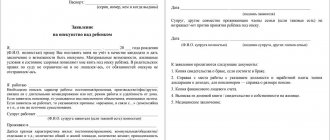Is the apartment suitable for children under guardianship?
The fact that a child has the status of an orphan or without parental care and the fact that he is under guardianship or in a foster family is not enough to give him the right to receive housing.
If a minor has the right to use municipal housing (he is a tenant or a member of the tenant’s family under a social tenancy agreement) or he owns an apartment, then the right to such living space is retained by him for the period of his stay under guardianship.
The exception is cases when living in the child’s own or used living space is considered impossible. Such a decision can only be made by a specially created interdepartmental commission of a local government body after reviewing documents confirming the reasons why the child will not be able to live in the previously occupied housing.
The guardian, who is the legal representative of the minor, must promptly take care of the implementation of his housing rights and, upon reaching the age of 14 years, contact the guardianship and trusteeship authority to include him in the list for housing provision.
What guardianship usually gives permission for and what it does not - we analyze the situations and conditions
When selling a child's real estate, you must provide him with something in return. To do this, his property rights and interests must be respected. Guardianship should monitor this, analyzing each situation.
A small digression - if you need free legal advice, write online to the lawyer on the right, order a call using the button on the left, or call (24 hours a day, 7 days a week): 8 (499) 938-45-78 (Moscow and region); (St. Petersburg and region); (all regions of the Russian Federation).
Situation No. 1 - Allocate to the child a similar share in the real estate purchased in exchange
- When purchasing another apartment (in the same city/location).
Here I mean buying on the secondary market and without a mortgage. This is the most common requirement for which guardianship easily gives permission. In this situation, the main thing for the guardianship authority is that the child’s share in the newly purchased apartment is no less in SIZE than in the one being sold.
For example, a one-room apartment of 40 sq.m. is for sale. The child’s share in it is 1/6, that is, approximately 7 sq.m. Parents (guardians) of the child are required to allocate at least the same 7 sq.m. to the child. in a new apartment. In this situation, they will receive permission to sell.
Of course, it is best when you buy an apartment with a larger area and number of rooms, and the child is allocated a larger share. In such a situation, it is easy to get permission. And so, the guardianship does not pay much attention to the total footage of the new apartment. The main thing is to respect the footage for the child.
On the other hand, according to law and logic, you need to look not at the footage, but at the cost of the apartment being sold and purchased. And based on the difference in cost, determine the child’s share. The courts have the same position.
For example, a child has 1/4 of a one-room apartment. Apartment area - 50 sq.m. This means the child has 12.5 sq.m. The apartment is sold for 4 million rubles, and in return they buy a more spacious one in a new house - 60 sq.m. for 7 million rubles. It turns out that the child’s share in the old apartment is valued at 1 million rubles. This means that, due to the difference in price, the child’s share in the purchased apartment should be 1/7, which is equal to 8.5 sq.m. But guardianship has its own requirements.
The sale of an apartment with minor owners must be certified by a notary - more details.
When buying an apartment with a mortgage.
Most guardianship authorities really do not like this case. Much depends on the city. For example, in Moscow local guardians always refuse. In St. Petersburg they allow it, but not all of them. Firstly, not every mortgage bank will agree to have a child as one of the owners. Secondly, even if the bank agrees (for example, Sberbank), the apartment (and therefore the child’s share) will be a pledge/encumbrance - Art. 1 and art. 19 of the Federal Law on Mortgage dated July 16, 1998 N 102-FZ. The guardianship believes that by pledging the child's share, his rights are impaired. Although the Supreme Court does not see a problem in this - Determination of August 6, 2013 No. 24-KG13-4.
Who has the right to an apartment
The conditions under which children left without parental care have the right to apply for an apartment at the expense of budgetary funds are established by Article 8 of Federal Law No. 159-FZ.
Thus, a minor can be included in the list for his further provision of living space if:
- there are no residential premises owned by him;
- the child does not have the right to use housing;
- the child cannot return to the residential premises that he occupied before he was placed under guardianship.
Residence of orphans in the previous living space is excluded:
- when the child’s parents live there and are deprived of parental rights, as well as citizens with certain chronic diseases (Order of the Russian Ministry of Health dated November 29, 2012 No. 987n);
- housing was declared unsuitable for habitation by a commission of a local government body in accordance with Decree of the Government of the Russian Federation of January 28, 2006 No. 47;
- when moving in a minor, the housing accounting norm for each resident established in a particular region will not be met;
- under other circumstances provided for by the regulations of the constituent entity of the Russian Federation.
Reference! The presence of a child’s home is not yet a basis for refusing to include him in the list. The characteristics of the living space and the living conditions in it must be examined by the guardianship and trusteeship authorities to make a decision.
If the owner is a child
Irina Pozharitskaya
We have already written that the sale of an apartment in which minors are registered no longer requires the consent of the guardianship and trusteeship authorities. But this does not apply to transactions with housing owned by children. What requirements do the guardianship and trusteeship authorities impose on purchased housing if the owners are minors?
Vera Fedorovna Ivashchenko, director of the Jasmine real estate agency:
When purchasing a new home , the child’s share must be taken into account (if he is one of the owners), and it is expressed in square meters. To protect the rights of the child, the guardianship authorities consider the area of the apartment , the improvement of the house, and sometimes the isolation of the rooms is taken into account. When purchasing a private home, its wear and tear is taken into account, which should be no more than 50 percent. It matters whether there are communications in the house (for example, hot and cold water, sewage), the number of rooms, and the material of the walls of the house are also important. When moving to another city or rural area, the OOP requirements for the purchased apartment increase. The buyer has to collect a lot of information, in particular, from the employment service (regarding employment in a new place), from the school where the child will study, and so on. The distance of the settlement from the regional center and other points are also taken into account. It is very difficult for one person to collect such a number of certificates on time. It is advisable to contact a real estate agency : specialists will take on the lion's share of your troubles.
Dmitry Aleksandrovich Peredelsky, director of LLC AN "Engineer":
— To contact the guardianship authorities, you need to collect a package of documents, which includes: an application, originals and copies of documents for both apartments (sold and purchased), copies of personal accounts, the child’s birth certificate, documents from the parents and a written request from a notary. A special article is housing in new houses. If you buy an apartment in a new building, you need to present to the Public Property Organization an agreement on shared participation in construction or an agreement on the assignment of ownership rights (it must include the details of the child with the share allocated to him). The problem is that these agreements must be registered with a justice institution if permission to build a house was received after April 1, 2005. Here you can encounter great difficulties, since, as we know, not all developers have such permission. The home must be more than 80 percent complete. This will also require a certificate from the developer. If the date of completion of the new building is still far away, the guardianship authorities may “wrap up” such a deal. In the new apartment, the child is allocated a share that must correspond to the one in which he lived. More is possible, but less is not possible. If you move to another city, the list of documents for OOP expands. You will need to show a preliminary purchase and sale agreement and copies of documents for the apartment, certified by a notary (of course, having made an advance payment for the purchased housing). If the apartment is not purchased immediately, you will have to contact the passport office for a certificate of consent from relatives living in another city, or those who are selling the apartment, to register you with them for the time being.
Yana Vladimirovna Matselevich, director of a legal real estate agency:
Prior permission (consent) of the guardianship and trusteeship authorities is required if the owners of the apartment are not the parents, but the minor himself. In addition, only with the consent of the guardianship authority is it possible to alienate an apartment in which a family member of the owner of the apartment under guardianship or trusteeship or a child left without parental care lives. It is worth noting that, as a rule, children who do not have parents or adoptive parents, as well as children whose parents have been deprived of parental rights, are under guardianship and trusteeship. Failure to comply with these rules leads to the invalidity of the transaction and the obligation of both parties to return what was received.
Lyubov Mikhailovna Pashkina, deputy director of the Lyubinskoye real estate agency:
— The main requirement that guardianship and trusteeship authorities make for real estate transactions is that the property rights of minors to housing are not violated. The main condition for obtaining permission for the transaction is improving the living conditions of the children. It is important that the purchased apartment has a similar or larger area than the previous one. Landscaping also plays a role. For example, if a family moves from a private house to an apartment “with amenities,” it is clear that living conditions will be much better. Or such a situation. Several families are moving away, but to smaller apartments. This is considered an improvement in conditions, because each family will have its own separate “territory”. For such transactions, permission can be obtained quickly and easily, within the established standard period - after 2 weeks, or 10 working days. To resolve unusual cases, a PLO commission usually meets. Let's say a family with a child who owns one-third share in an apartment is going to buy a house in the village. The commission decides how suitable the house is for living, whether the parents will be provided with work, and so on. If the child was the owner of an apartment inherited from one of the parents, the guardianship authorities give permission for a transaction that will secure his right to part of the space in the new apartment. It must be said that recently permits have begun to be issued faster than before. It is felt that the workload of inspectors has decreased, since their consent is no longer required for the sale of apartments in which children are registered. Previously, if you remember, the period for making a decision on issuing a permit was a month. As for the procedure: if the child is over 14 years old, he must come to Oblono (K. Liebknecht St., 33) and sign the application together with his parents.
Elena Mikhailovna Nikonorova, director of the Bonus real estate agency:
When buying a private house, it is quite difficult to “fit” into the requirements of the OOP, since the wear and tear of a residential building should be no more than 49 percent. Initially, it is understood that exchanging an apartment for a house means some deterioration in living conditions. It is more likely to receive permission to purchase a house in cases where a large family wants to exchange a small apartment for a house of a much larger area. To purchase a private house, in addition to the basic documents, you will also need a certificate from the school where the child is going to study, a housing inspection report signed by a school representative, etc. In my practice, there was such a situation, one might say, an exception to the rule. The mother and child moved to a smaller apartment on the outskirts in order to be able to use the remaining funds from the sale of their previous home to pay off considerable debts on utility bills. They had to take the PLO commission to the site to convince them that the deal was in the interests of the family, which was threatened with having everything cut off. In general, guardianship authorities usually consider the totality of all factors so that ultimately the child’s living conditions do not worsen.
Queue order
The rules and procedure for including children in the queue are established by Decree of the Government of the Russian Federation dated April 4, 2019 No. 397, according to which the list is formed as follows:
- Legal representative of a minor. who has reached the age of 14, applies to the authorized body (usually the guardianship and trusteeship authority) with an application in the prescribed form, which must be considered within 60 working days. If within 3 months the guardian has not initiated the filing of an application, then such responsibility is assigned to the guardianship authorities.
- The legal representative must attach to the application a list of documents approved by the regulatory legal act of the region where the child and his guardian live. A legal representative has no right to refuse to accept documents. If there are inaccuracies in the documents, a request for clarification of information should be sent to the guardian.
- After the application is accepted and registered by the authorized body, a minor’s record file is created, which contains all the submitted documents and responses to requests from the government agency.
- Based on the results of consideration of the application, the government agency issues an administrative document to include the child in the list or a reasoned decision to refuse (in the absence of legal grounds for providing the child with housing). A negative decision can be appealed by the guardian in court.
Selling an apartment for an incapacitated person
Info
Law, wards and guardians have no rights to each other's property. The exception is if the property is in common shared or joint ownership.
To your relatives Part 3 Art. 37 of the Code establishes a direct ban on transactions between the ward and:
- by the guardian himself;
- his spouse;
- close relatives of the guardian.
The exception is transactions aimed at improving the property status of the ward, for example, the transfer of an apartment or house by the guardian or his close relative as a gift to the ward.
According to the regulations, if the guardianship authority discovers that a contract has been concluded without prior consent, it (the authority) can file a claim to terminate the transaction in court. Termination will be made on the basis of Art. 450-453 of the Code. What comes next:
- the property received by the bona fide purchaser will be returned to the ward;
- losses that were caused to the buyer of the apartment and other third parties are subject to compensation by the guardian in the manner provided for in Art. 15 of the Code.
https://www.youtube.com/watch{q}v=QEGlTF4WliQ
When making transactions on behalf of an incapacitated person, his opinion must be taken into account (if at all possible). If it is not possible to get an opinion, you need to ask the ward’s parents, other relatives or persons who in one way or another provided services to such a citizen.
Often, many people providing guardianship have questions about a citizen’s belongings or real estate: can a trustee dispose of the property of the ward{q} Read our article about the peculiarities of interaction between the guardian and the material assets of the ward. Who are guardians? A guardian is a representative of an incapacitated citizen, who is his representative before the law and educator, and also provides full supervision.
- Full guardianship: assigned to children under 14 years of age and citizens incapacitated due to mental disorders.
The law establishes a special legal regime for the real estate of wards. The property of wards is not subject to alienation, except in the following cases:
- the property is seized by bailiffs by virtue of a court decision;
- the apartment is alienated under a rent or exchange agreement, if the terms of such a contract are aimed at improving the living conditions of the ward;
- the apartment is alienated due to a change of residence of the ward;
- real estate is alienated due to the need to obtain funds to pay for the expensive treatment of the ward.
To carry out the above transactions, you will also need permission from the guardianship authorities (Part.
2 tbsp. 20 of this Law). After his death P. 1 part 1 art. 29 of the Law establishes that if the guardian or the ward himself passes away, then guardianship is terminated. By virtue of Art.
If it is discovered that an agreement has been concluded on behalf of the ward without the prior permission of the guardianship and trusteeship authority, the latter is obliged to immediately apply on behalf of the ward to the court with a request to terminate such an agreement in accordance with civil law, except for the case if such an agreement was concluded for the benefit of the ward.
Attention
When submitting an application for a permit, the guardian or trustee is obliged to indicate at the expense of which property the loan obligation will be fulfilled. 5. The ward’s property is not subject to loan transfer, except if the loan repayment is secured by a mortgage (real estate pledge).
6. The guardian does not have the right to enter into an agreement on the transfer of the ward’s property for use, and the trustee does not have the right to give consent to the conclusion of such an agreement if the period of use of the property exceeds five years. In exceptional cases, the conclusion of an agreement on the transfer of the property of a ward for use for a period of more than five years is permitted with the prior permission of the guardianship and trusteeship authority in the presence of circumstances indicating the special benefit of such an agreement, unless a different deadline is established by federal law. Article 20. Federal Law. Article 18. Protection of the property of the ward 1. The guardian or trustee, with the exception of trustees of citizens limited by the court in legal capacity, is obliged to accept the property of the ward according to the inventory from the persons who stored it, within three days from the moment of the emergence of his rights and obligations.
An inventory of the ward's property is compiled by the guardianship and trusteeship authority in the presence of a guardian or trustee, representatives of a homeowners' association, housing, housing construction or other specialized consumer cooperative that manages an apartment building, a management organization or internal affairs bodies, as well as a minor ward who has reached the age of fourteen years, at his request. When compiling an inventory of the ward's property, other interested parties may be present.
When donating such an apartment, a simple form of gift agreement is suitable. Example No. 3. Spouses Vasily and Elena bought an apartment while married, but registered it only in Evgeniy’s name. In this case, the apartment is still the joint property of both spouses.
It doesn’t matter to whom they give the apartment (to one person or several persons in shares, a relative or not), a gift agreement in a simple form will do.
But Elena will be required to obtain consent for the donation from a notary. It costs 1 - 2 tr. In principle, you can have a donation agreement certified by a notary at your own request, even if this is not necessary. Yes it is possible. This is usually done when there is a fear that interested parties will want to challenge the deed of gift.
Details of the question My mother-in-law is the guardian of an incapacitated disabled brother. It is possible to write a gift agreement.
2) the gift agreement was executed by a minor or incompetent person.
3) A gift agreement may be declared invalid as imaginary/sham if it is proven that the donation was made to cover up another transaction or without the purpose of creating appropriate legal consequences. An example of such a transaction is when a person who has a debt gives all the property to a close relative, and then refers to the lack of money.
You can find out the details for transferring funds at the department where you plan to undergo the procedure, or on the department’s website.
When paying, you must receive a receipt or check to confirm it.
We invite you to read: Can they be evicted from an apartment: all possible cases 2020
The child may not be present during the signing of the contract and further operations. After 14 years of age and until adulthood, a citizen has the right to enter into transactions if there is appropriate permission from his representatives. The document is signed by the recipient, as well as his parent or other responsible person.
They release him, but on the condition that he will be incompetent to live in it until death. Vryatli. he has a guardian. and he will then be able to dispose of the property.1. As far as I remember, only a court can declare a person incompetent.
Argunov. If, when establishing guardianship over a person recognized by the court as incompetent, the guardian retains his powers in relation to property not transferred to the There is no certainty in the procedure for concluding a trust management agreement.
d. Incapacity of the donor during the preparation and signing of the contract. Article 171 of the Civil Code defines incapacity as the presence of a mental illness or disorder of the donor at the time of the conclusion of the transaction.
In Art. 177 states that the contract is illegal due to the donor’s unawareness of the actions he is performing (for example, under the influence of alcohol or drugs).
Infliction of bodily injury to the donor, members of his family or relatives, an attempt on the life of any of them by the person in whose favor the property is alienated under the contract (Article 578 of the Civil Code of the Russian Federation, Part 1). In Art. 170 of the Civil Code of the Russian Federation, an agreement is declared invalid if it was concluded with the aim of concealing another legal procedure.
Children aged 14-18 have the right to independently resolve legal issues.
In order to prepare for the procedure of donating valuables to a minor, it is necessary to submit documents confirming:
- family ties and guardianship of a minor;
- permission from the guardianship authorities to carry out transactions for the parents of the donor who is under 14 years of age, or permission for a minor over 14 years of age to independently perform legal actions.
- consent of parents (guardians) to donate property to a child over 14 years of age;
- the presence of property in a minor, as well as the right to dispose of material assets at the age of 14-18 years;
The absence of such documents guarantees the impossibility of donating property. There are 2 forms of gift agreement: oral and written.
The number of its copies corresponds to the number of participants. An additional copy is required for Companies House.
The law provides the following list of documents for a deed of gift for an apartment in 2021.
- For a transaction under a power of attorney, authorized persons (representatives) must notarize both the power of attorney and its copies.
- Certificate about the residents registered in the apartment.
- Consent to the transaction of the relatives and spouses of the donor, who are co-owners of the apartment.
- Passports of the parties to the transaction.
- Certificate of registration of ownership of the donor's real estate.
- Extract their registration certificate, which must be obtained from the BTI.
Registration of a deed of gift for an apartment through a notary The cost of registering an agreement with a notary is, on average, about 2000 rubles.
Info
To obtain consent from guardianship, the following documents are required:
- the owner’s consent to the alienation, certified by a notary;
- passports of both parents/guardians;
- ID card of the share owner;
- certificate of right to a share in the apartment;
- technical passports for the alienated living space and the one that is issued in exchange;
- application for consent to donation on behalf of a minor citizen.
If permission is nevertheless received from the guardianship authorities, then it must be signed by a notary. The request is considered within 2 weeks, after which the guardianship authority gives a written response: permission or refusal. Important! If a violation is detected in the donation transaction on the part of parents/guardians/other substitute persons, the transaction will be declared illegal and the property will be returned to the owner.
Important
Can I register in an apartment? Guardianship is a voluntary matter, not financially supported by the state, for which the guardians receive only seniority. At the same time, they often have a question: what to do with the property of the ward, for example, the apartment of an incapacitated citizen or a child{q} Can they exchange or sell it if necessary or dispose of it in some other way{q} According to the law, all the property of the ward, outside depending on the circumstances, belongs to him, and the person looking after the elderly has no right to it. This is also true in the opposite direction: the ward also cannot dispose of the property of the guardian.
It is worth noting: the person caring for him also does not have the right to register in the ward’s apartment. In this case, the trustee can use the property at his own discretion, for example, sell it if permission from the trusteeship authorities is obtained. But it is better that the new housing provides the future owner with better living conditions.
- for renting out the ward’s real estate for rent, rent, collateral or free use;
- on the alienation of property of a minor (sale, exchange, donation);
- on renunciation of rights belonging to the child;
- on the division or allocation of shares from property;
- any other transactions aimed at reducing the value of property (Article 21 of the Federal Law No. 48 of April 24, 2008, Art.
- larger housing;
- an apartment with the same number of square meters, but with a separate room for a child;
- real estate in a more prestigious area, with improved infrastructure and better conditions (for example, a school is located nearby).
List of documents
Federal legislation defines only the basic list of documents that must be submitted when deciding whether to be included in the queue.
Thus, the applicant must attach the following copies of documents to his application:
- birth certificate and passport of the child;
- documents on the right to use residential premises;
- act of the guardianship authority on the appointment of a guardian;
- documents on the absence of parental care;
- decision on the impossibility of living in the existing residential premises.
Attention! Additional documents are determined by regional legislation, so before submitting an application you must obtain a complete list from the guardianship and trusteeship authority.
When can I get an apartment?
According to the law, housing for children on the waiting list is provided upon their personal application when they reach the age of majority or acquire full legal capacity before the age of 18.
The possibility of providing housing up to 18 years of age is also provided for by law. However, it is worth noting that a citizen included in the list is provided with housing after:
- release from an organization for orphans of any kind;
- completion of the organization of vocational education;
- completion of military service;
- release from prison.
In practice, waiting for the required square meters can drag on for years. Often, persons awaiting the implementation of their rights turn to court to protect their interests. In many regions, a queue has already formed of those who must be provided with housing by court decision.
A person from among orphans under a specialized rental agreement must be provided with housing that meets certain requirements:
- The living space must be separate. This could be a residential building or an apartment. Providing rooms in an apartment, thereby creating the conditions of a communal apartment, is prohibited by law.
- Housing improvement must meet the conditions that exist in a particular locality. As a rule, this concerns the presence of water supply, heating systems, and sewerage in a residential area.
- The standard for the provision of housing is established by regulations of the constituent entities of the Russian Federation.
In recent years, many regions have faced the problem of local settlement of orphans. Thus, an entire apartment building or a large part of it could be inhabited by citizens of this category, which created social tension in places of their mass settlement.
In this regard, changes were made to Law No. 159-FZ to limit the provision of apartments in one building. Authorities are allowed to provide no more than 25% of the total number of apartments in an apartment building. The exception is settlements whose population does not exceed 10,000 people.
Ward's property
The property of the wards remains such, despite the fact that they do not have the right to dispose of it independently. Not a single transaction will be notarized, and if notarized, it can be easily challenged if the person is declared incompetent. Transactions that are concluded before a court verdict on the lack of legal capacity must be completed, as they are considered legal, unless the contrary is proven.
Note!
The guardian cannot lay claim to real estate or other valuables belonging to the ward. But he can carry out some actions to protect the interests of the incapacitated person and preserve his rights in relation to existing property.
Federal Law No. 48 explains that the powers of an official representative include the following actions:
- Protection of immovable assets.
- Limited disposal of property.
But you cannot exceed the available powers, since for every action in excess of the established minimum you will have to answer according to the law. Illegal actions may result in administrative or even criminal penalties.
Security
The most important responsibility of the representative when it comes to the property of the ward is its safety. The guardian must ensure that everything that the person with limited legal capacity had in his possession remains with him. At the same time, it is extremely important that real estate assets are provided with:
- Maintaining the original cost.
- Extracting income from it, but only in the interests of the owner himself.
To perform these actions, the trustee does not have to attract his own funds. When it comes to the need to make payments for security actions, all expenses are made at the expense of the property of the ward.
Important!
Any actions that entail material costs or are associated with making decisions on existing values must be agreed upon with the guardianship department. Authority employees assess the need for spending and give their official permission or, conversely, prohibit actions.
Order
The disposal of real estate in the broad sense of the word means a fairly wide range of actions. But when performing guardianship duties, we are talking about specific items that are allowed to be performed independently or with the consent of the employees of the guardianship department.
Article 19 of Federal Law No. 48 stipulates that the powers of the trustee regarding the property of his ward must be enshrined in writing. He can act within the specified points. When guarding an incapacitated person, a guardian may dispose of his property as follows:
- Deposit money into bank accounts opened in the name of the ward.
- Pay utility bills for existing property on behalf of their owner.
The list of prohibitions on disposal is much longer. Thus, a representative cannot:
- Take out loans or loans in the name of your ward.
- Mortgage his property.
- Rent out housing for a long period of time without grounds and permission from the guardianship department.
- Sell living space.
Additional information All prohibitions have their exceptions. Thus, a loan can be issued if it is taken out for the needs of the patient, and its repayment is ensured. Real estate can be mortgaged if a mortgage is issued in the name of an incapacitated person.









